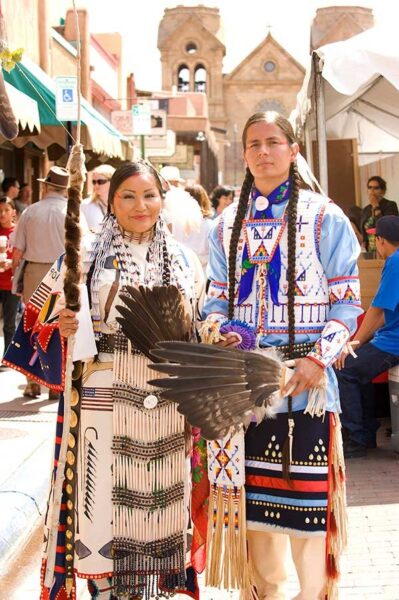
- Details
- By Rich Tupica
SANTE FE — While the Santa Fe Indian Market (SWAIA) was cancelled due to COVID 19, the colossal Native arts event is moving ahead online.
According to a release from SWAIA’s Kimberly Peone, the event has been revamped into a Virtual Indian Market following a partnership with Clark Hulings Fund for Visual Artists (CHF), a Santa Fe-based nonprofit.
“SWAIA has hired [CHF] to serve as project manager for the Virtual Market, and provide us with the support and expertise that comes with their decades of experience,” Peone said. “We feel the partnership is exactly what SWAIA needs as we explore new territory. [We] see this as an opportunity to expand our mission to serve artists and the art community in a broader way.” According to the SWAIA release, the virtual platform will accommodate more artists than the physical market, which is constrained by limited space in downtown Santa Fe. With this new virtual setup, artists who were juried in in 2020, but on the waitlist for a booth, will now have a chance to participate. Other fresh programming on the website will include a fashion show, virtual exhibits and more.
SWAIA, which is approaching its centennial year, has a rich history in supporting Native arts. First launched in 1922, today the annual market attracts more than 115,000 people and generates over $160 million dollars in revenues for the state and region.
More Stories Like This
Native News Weekly (August 25, 2024): D.C. BriefsUS Presidents in Their Own Words Concerning American Indians
Native News Weekly (December 14, 2025): D.C. Briefs
Wounded Knee Massacre Site Protection Bill Passes Congress
Two Murdered on Colville Indian Reservation
Help us defend tribal sovereignty.
At Native News Online, our mission is rooted in telling the stories that strengthen sovereignty and uplift Indigenous voices — not just at year’s end, but every single day.
Because of your generosity last year, we were able to keep our reporters on the ground in tribal communities, at national gatherings and in the halls of Congress — covering the issues that matter most to Indian Country: sovereignty, culture, education, health and economic opportunity.
That support sustained us through a tough year in 2025. Now, as we look to the year ahead, we need your help right now to ensure warrior journalism remains strong — reporting that defends tribal sovereignty, amplifies Native truth, and holds power accountable.
 The stakes couldn't be higher. Your support keeps Native voices heard, Native stories told and Native sovereignty defended.
The stakes couldn't be higher. Your support keeps Native voices heard, Native stories told and Native sovereignty defended.
Stand with Warrior Journalism today.
Levi Rickert (Potawatomi), Editor & Publisher
